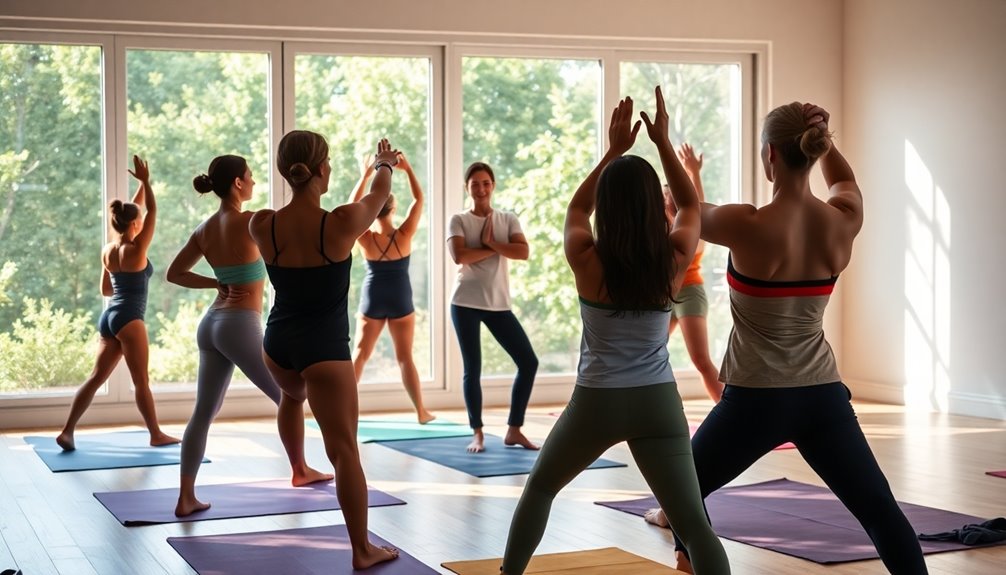Physical health in holistic wellness goes beyond just avoiding illness. It involves regular exercise, balanced nutrition, adequate sleep, and effective stress management, all interconnected to enhance your overall well-being. By focusing on these aspects, you'll boost your mental health, improve your mood, and build resilience against stress. Nutritional choices, physical activity, and self-care are essential. When you prioritize these elements, you'll discover a deeper understanding of your health journey and its broader impacts.
Key Takeaways
- Physical health in holistic wellness encompasses regular exercise, balanced nutrition, adequate sleep, and effective stress management practices.
- It promotes overall well-being by enhancing cardiovascular health, boosting energy, and supporting cognitive function.
- Incorporating mindful practices and hydration is crucial for maintaining physical health and resilience.
- Strong social connections and group activities improve physical health through emotional support and reduced stress.
- Professional guidance from healthcare providers and wellness coaches can optimize physical health outcomes in a holistic approach.
Defining Physical Health in Holistic Wellness

When you think about holistic wellness, it's vital to recognize that physical health isn't just about avoiding illness; it's about embracing a lifestyle that includes regular exercise, balanced nutrition, sufficient sleep, and effective stress management.
To achieve ideal physical health, aim for at least 30 minutes of moderate-intensity exercise five days a week. This routine not only boosts your cardiovascular health but also reduces stress levels.
Pair this with a balanced diet rich in nutrient-dense foods to enhance your energy and concentration.
Don't underestimate the importance of adequate sleep, which is critical for cognitive function and emotional stability.
Incorporating stress management techniques like mindfulness can further elevate your overall well-being, creating a holistic approach to physical health. Additionally, maintaining adequate hydration is essential for overall bodily functions, including physical health.
The Interconnection of Physical Health With Other Wellness Dimensions

Physical health serves as the bedrock of holistic wellness, intricately linked to emotional, mental, social, and spiritual dimensions.
When you prioritize physical wellness, you enhance your overall health and well-being in multiple ways:
- Mental Health: Regular exercise boosts your mood, reducing symptoms of anxiety and depression.
- Emotional Health: Good physical health helps lower stress and increases self-esteem, fostering resilience.
- Social Health: Engaging in group activities, like sports or classes, strengthens bonds and creates a support network.
- Holistic Wellness: A balanced lifestyle encourages positive choices, reinforcing the connections among all wellness dimensions.
Key Components of Physical Health

To boost your physical health, you need to focus on a few key components: regular exercise, balanced nutrition, and effective stress management. Incorporating these elements into your daily routine can enhance your energy levels and improve your overall well-being. Additionally, engaging in mindfulness practices can also contribute positively to your physical health journey. Let's explore how each of these factors plays a vital role in your physical health journey.
Importance of Regular Exercise
Regular exercise plays an essential role in maintaining your overall health and well-being, as it not only strengthens your heart but also reduces the risk of chronic diseases.
Engaging in regular physical activity can greatly improve your wellness and energy levels.
Here are four key benefits of consistent exercise:
- Boosts cardiovascular health – Enhances heart function and circulation.
- Improves mood – Releases endorphins that combat anxiety and depression.
- Supports weight management – Burns calories and increases metabolism.
- Enhances physical fitness – Builds strength, endurance, and flexibility through activities like strength training.
Additionally, maintaining high vibrational energy during workouts can further amplify the benefits of exercise and enhance your overall experience of well-being through the Law of Attraction.
Balanced Nutrition Essentials
Staying active through exercise is just one part of a holistic approach to health; balanced nutrition is equally important.
A healthy diet rich in nutrient-dense foods like fruits, vegetables, whole grains, lean proteins, and healthy fats supports your physical well-being and enhances energy levels. Regularly consuming balanced meals helps sustain your energy throughout the day, reducing fatigue and boosting productivity.
Don't overlook proper hydration—aim for at least 8-10 cups of water daily to keep your body functioning efficiently and to prevent dehydration. Incorporating high-protein breakfasts can also provide essential nutrients to kickstart your day effectively.
Remember, nutritional deficiencies can lead to serious health issues, so prioritizing a well-rounded diet is crucial for preventing chronic diseases and ensuring long-term health.
Make these nutrition essentials a part of your daily routine!
Stress Management Techniques
While managing stress might seem like a secondary concern in physical health, it plays an essential role in your overall well-being. Effective stress management techniques can greatly reduce stress and improve your physical health.
Here are four strategies to contemplate:
- Mindfulness Meditation: Practice mindfulness to lower cortisol levels and enhance relaxation.
- Regular Physical Activity: Engage in aerobic exercises to release endorphins, which boost mood and reduce stress.
- Adequate Sleep: Prioritize restful sleep to allow your body to recover and maintain immune function.
- Proper Nutrition: Eat a balanced diet rich in fruits, vegetables, and whole grains to stabilize blood sugar and improve mood. Incorporating protein-rich breakfast options can also support energy levels and overall well-being.
Incorporating these techniques into your routine supports holistic wellness and promotes lasting physical health.
Benefits of Regular Exercise for Overall Well-Being

Exercise plays an essential role in enhancing your overall well-being, as it not only boosts physical health but also greatly improves mental and emotional states.
By engaging in regular physical activity, you can reap the benefits of holistic health, including improved cardiovascular health and reduced risk of chronic diseases.
Regular exercise helps manage stress, promoting emotional stability and reducing anxiety and depression symptoms.
Additionally, it considerably improves sleep quality, allowing you to fall asleep faster and enjoy deeper rest.
With consistent activity, you'll also enhance cognitive function, benefiting memory and concentration.
Embracing a healthy lifestyle through exercise ultimately supports your health and well-being, creating a foundation for extensive wellness in your life.
The Role of Nutrition in Physical Wellness

Physical wellness isn't just about staying active; nutrition plays a significant role in how you feel and perform daily. A balanced diet fuels your body and supports immune health, enhancing your energy levels and concentration.
To promote physical wellness, focus on:
- Eating a variety of foods: Include fruits, vegetables, whole grains, lean proteins, and healthy fats.
- Making informed dietary choices: Avoid processed foods to reduce the risk of chronic diseases like obesity and diabetes.
- Staying hydrated: Aim for at least 8 cups (64 ounces) of water daily to aid digestion and nutrient absorption.
- Considering nutritional supplements: Address deficiencies, especially if you have dietary restrictions or increased nutritional needs. Including foods rich in vitamins and antioxidants can further support your overall health.
Importance of Sleep for Physical and Mental Health

Sleep is more than just a time for rest; it's an essential component of your overall health and well-being. The importance of sleep can't be overstated when it comes to both physical health and mental health.
Adequate sleep repairs tissues, supports muscle growth, and boosts your immune function, while sleep deprivation can lead to serious health concerns like obesity and diabetes. Quality sleep enhances cognitive functions, stabilizes your mood, and reduces anxiety and depression, making it crucial for holistic wellness. Furthermore, positive thinking can significantly improve your sleep quality by reducing stress and promoting relaxation.
Incorporating a consistent sleep schedule into your daily routine can help regulate stress hormones and improve memory and decision-making. Prioritizing sleep isn't just a luxury; it's a necessity for your overall health and quality of life.
Stress Management Techniques for Physical Resilience

While juggling daily responsibilities, it's easy to overlook the importance of stress management for enhancing your physical resilience.
Implementing effective stress management techniques can help you thrive. Consider the following strategies:
- Mindfulness meditation: Practicing mindfulness can reduce tension and lower cortisol levels.
- Regular physical activity: Engage in aerobic exercises or yoga to boost cardiovascular health and relieve stress.
- Nutritional strategies: Focus on a balanced diet rich in omega-3 fatty acids and antioxidants to combat stress responses and inflammation.
- Cultivate social relationships: Maintain strong connections for emotional support, which buffers stress effects on physical health.
Integrating these techniques will greatly improve your sleep quality and overall physical resilience, helping you navigate life's challenges with ease. Additionally, incorporating mindfulness techniques can enhance your ability to focus and reduce internal chatter, further supporting your physical health journey.
Professional Support in Achieving Physical Wellness

Integrating stress management techniques into your routine can set the stage for seeking professional support in achieving physical wellness.
Engaging with healthcare providers like physicians and nutritionists allows you to develop personalized exercise and dietary plans tailored to your needs.
Wellness coaches play a crucial role in offering tools for behavior change and motivation, helping you consistently incorporate physical wellness practices into your life.
If you're recovering from an injury or aiming to prevent one, physical therapists guarantee you can engage in exercise safely and effectively.
Joining group fitness classes led by certified instructors fosters community and boosts motivation.
Regular check-ins with health professionals maintain a holistic approach, tracking your progress and adjusting strategies to address any emerging physical health concerns. Additionally, incorporating pet therapy can enhance emotional well-being, which is essential for overall physical health.
Holistic Strategies for Maintaining Physical Health

To maintain physical health effectively, you can adopt a variety of holistic strategies that prioritize balance and well-being.
Implementing these wellness initiatives can greatly enhance your overall health:
- Regular Exercise: Aim for at least 30 minutes of moderate-intensity activity five days a week to boost cardiovascular health and reduce stress.
- Balanced Diet: Focus on nutrient-dense foods and stay hydrated to maintain energy levels and support physical well-being.
- Stress Management: Incorporate mindfulness and relaxation techniques to improve resilience and health outcomes.
- Adequate Sleep: Target 7-9 hours of quality sleep each night for better cognitive function, emotional regulation, and physical recovery. Additionally, consider practicing deep breathing techniques to further enhance your relaxation and sleep quality.
Frequently Asked Questions
What Does "Physical" Mean in Health?
In health, "physical" refers to your body's overall condition and how well it functions. It encompasses your fitness level, nutrition, and the quality of your sleep.
When you're physically healthy, you feel energized and capable. You need to engage in regular exercise, eat a balanced diet, and guarantee you get enough rest.
What Is the Holistic Definition of Physical Activity?
Did you know that only about 23% of adults meet the recommended physical activity guidelines?
In a holistic sense, physical activity isn't just about exercise; it's any movement that gets your muscles working and boosts your energy. This can include everything from walking and dancing to gardening and playing sports.
Engaging regularly in these activities not only enhances your physical health but also uplifts your mental and emotional well-being, creating a balanced lifestyle.
What Is Physical Development in Holistic Development?
Physical development in holistic development involves enhancing your body's capabilities, like strength, flexibility, and endurance.
You're not just focusing on exercise; it encompasses a balanced diet and proper sleep, too. Engaging in regular physical activities boosts your mood and reduces stress, creating harmony in your life.
Plus, participating in group sports or fitness classes helps you connect with others, enriching your emotional well-being while you work towards your physical health goals.
What Is a Holistic Physical Assessment?
Imagine a garden where each flower thrives because of the care given to its roots, leaves, and sunlight.
A holistic physical assessment works similarly. It evaluates your physical health by examining not just your body but also your emotional, mental, and social well-being.
Conclusion
In the journey toward holistic health, your physical well-being is just the beginning. Imagine the ripple effects as you nurture your body through exercise, nutrition, and sleep. What if you could access a newfound resilience against stress? Picture yourself thriving, not just surviving. The secrets to maintaining your physical health are waiting for you to discover. So, are you ready to take that next step and embrace a vibrant, balanced life? The adventure is just around the corner!









